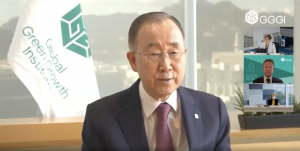 October 27, 2021; As part of GGGWeek 2021, GGGI and the British Embassy in Seoul hosted a virtual session on The Road to COP26: What does success look like for developed and developing countries. The session served as an opportunity for experts and decision makers from developing and developed nations to address their expectations for COP26 and to understand how international organizations, like GGGI, have provided a range of services for its Members and partners, which have directly and indirectly supported the NDC revision process.
October 27, 2021; As part of GGGWeek 2021, GGGI and the British Embassy in Seoul hosted a virtual session on The Road to COP26: What does success look like for developed and developing countries. The session served as an opportunity for experts and decision makers from developing and developed nations to address their expectations for COP26 and to understand how international organizations, like GGGI, have provided a range of services for its Members and partners, which have directly and indirectly supported the NDC revision process.
“We can read and hear—almost on a daily basis now—about how climate change fuels conflicts, spurs migration, and poses serious public health risks to people everywhere. It is absolutely crucial that we turn carbon neutrality pledges into action and develop sustainable solutions to solve this crisis and build back better,” shared GGGI President & Chair, H.E. Ban Ki-moon, in his video message to open the session.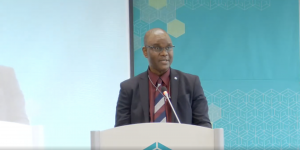
Mr. Mahamadou Tounkara, Director, Office of the Director-General (ODG) of GGGI, delivered welcoming remarks at the session sharing, “the developing world is the least responsible for climate change, but as we all recognize, they are the most vulnerable to the impacts. Due to ongoing concerns over the Pandemic, there is a call for COP26 to be inclusive to ensure that there are strong voices of Least Developed Countries in decision making so that they can benefit in the shift to low emission development pathways.”
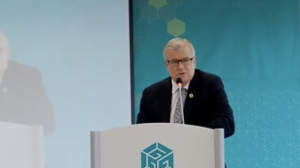 Following these remarks, H.E.Simon Smith, British Ambassador to the Republic of Korea, delivered an introductory speech highlighting the importance of the upcoming COP26.
Following these remarks, H.E.Simon Smith, British Ambassador to the Republic of Korea, delivered an introductory speech highlighting the importance of the upcoming COP26.
“This has to be the COP that keeps 1.5 degrees Celsius within reach that puts the planet on a path to driving down emissions with mid-century net-zero commitments and ambitious 2030 emissions reduction targets which are in turn underpinned by real measurable action,” shared Ambassador Smith.
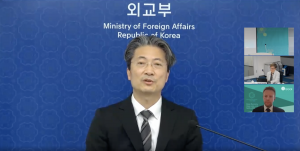
During the session, a video message from the Director-General of the Ministry of Foreign Affairs of the Republic of Korea, Mr. Tong Q Lee, was showcased. “While the challenges of the COVID-19 pandemic remain, we are seeing how rapidly climate change is unfolding. As we navigate through these challenging global issues, it becomes clearer that no single country can tackle them alone.”
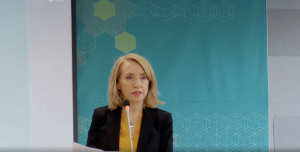
H.E. Gloria Cid Carreño, Chilean Ambassador to the Republic of Korea, also delivered a speech during the event sharing, “The Paris Agreement contains common objectives for all countries. This can only be achieved if there is trust among them based on the veracity of the contributions they make,” highlighted Ambassador Carreño
The speeches were followed by a panel discussions moderated by Ingvild Solvang, GGGI Head of Climate Action & Inclusive Development (CAID), on the importance of securing global net zero emissions by 2050, deploying adaptation measures to protect those who are the most climate vulnerable, mobilizing financial resources for developing countries, and stepping up efforts to engage with government representatives, business leaders, and civil society groups.
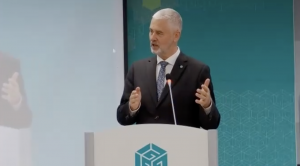 Director-General of GGGI, Dr. Frank Rijsberman, delivered remarks to close the session. “At GGGI, we looked at the job impacts of the NDCs of 29 of our Members, in terms of Renewable Energy, and found if those NDCs are delivered, they will also generate 10 million job years from meeting the renewable energy targets in those NDCs … I think the critical message for many of our Member governments is you can actually combine a green recovery with accelerated climate action because implementing the NDCs can generate green employment.”
Director-General of GGGI, Dr. Frank Rijsberman, delivered remarks to close the session. “At GGGI, we looked at the job impacts of the NDCs of 29 of our Members, in terms of Renewable Energy, and found if those NDCs are delivered, they will also generate 10 million job years from meeting the renewable energy targets in those NDCs … I think the critical message for many of our Member governments is you can actually combine a green recovery with accelerated climate action because implementing the NDCs can generate green employment.”